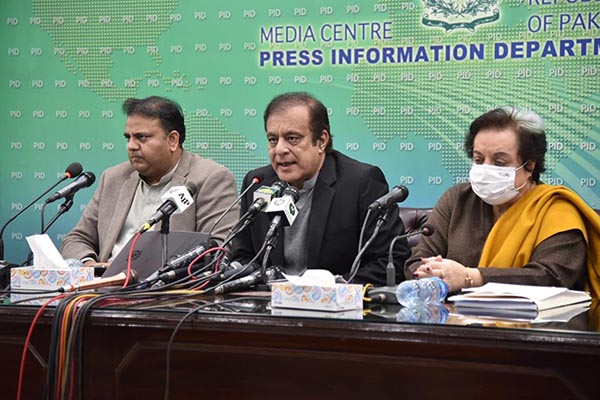
Courtesy PID
Inquiry to be completed within 45 days, with a mandate of fixing responsibility of anyone who benefited from the agreement with the assets recovery firm
The federal cabinet on Tuesday constituted an inquiry committee to investigate within 45 days the “revelations” of the Broadsheet LLC scandal and fix responsibility on those Pakistanis who allegedly benefited themselves and laundered money to offshore bank accounts.
Addressing a press conference, Information Minister Shibli Faraz—flanked by Science and Technology Minister Fawad Chaudhry and Human Rights Minister Shireen Mazari—said the committee would be led by a former judge of either the Supreme Court or a high court. “The committee would comprise one representative each of the Federal Investigation Agency (FIA) and the Attorney General for Pakistan, besides a senior advocate to be nominated by the prime minister,” he said, adding that strict action would be taken against anyone identified by the committee as having “looted” the national exchequer.
“The Broadsheet verdict was based on facts about the corruption stories of previous rulers,” claimed Faraz, even though the ruling primarily dealt with the recoveries that could potentially have been obtained if the deal with Broadsheet had not been cancelled, and does not actually fix any corruption on any identified party. “It contains details of corruption of loot and plunder committed before 2000, but another inquiry was required to look into the wrongdoings done after 2000,” he added.
Reiterating the incumbent government’s longstanding narrative of former rulers having benefited from NRO [National Reconciliation Ordinance] concessions, he alleged that previous governments had “misappropriated the national exchequer time and again.” To a question, he claimed that Broadsheet had unearthed the hidden properties of the Sharif family—a false assertion as the U.K. ruling has cited a JIT ruling of Pakistan’s Supreme Court for determining offshore assets.
To another question, Faraz said the government, along with the public, was primarily interested in recovering “looted money,” and would take action against any corrupt individual regardless of their party affiliations. [The PPP’s] Surrey Palace, Swiss accounts, Omni case, fake bank accounts case, all are on the radar of the committee, he said, adding that the Terms of Reference of the committee covered the inquiry committee’s mandate.
TORs
The Terms of Reference for the inquiry committee, which has been empowered to summon any individual or record from any organization it deems fit, are as follows:
- Selection: The committee has been tasked to look into how Trouvons LLC, Broadsheet and International Asset Recovery Limited were selected to investigate offshore accounts. Who introduced the firm, conducted due diligence? Why did the firm change from Trouvons LLC to Broadsheet? Who drafted the agreement and were measures included to protect interests of the Government of Pakistan? Was the agreement vetted by lawyers, and why was it in both the government and NAB’s name?
- Contract cancellation: The committee has been directed to determine when NAB decided to terminate the agreement and why the contractual obligation to provide a 30-day notice period was not followed. It must also look at the advice given by Kendall Freeman Solicitors and whether Broadsheet was informed in advance of the pending cancellation. Was there any response from Broadsheet’s lawyers and appropriate legal advice by Kendall Freeman?
- Settlements: The committee must determine what the terms of settlement with IAR in January 2008, as well as the purported settlement in May 2008 with Broadsheet, were, as well as how the figures to be paid were determined. What legal advice was sought and method of payment agreed upon?
- Arbitration: The inquiry will examine the manner in which the government arbitrated the proceedings before the London Court of International Arbitration and litigated the appeal in the High Court of Justice in London. Was advice sought on the merits of the case and the hiring and selection of counsel? Why was a new firm selected and what defenses were forwarded?
- Payment: The committee would also look at the process of paying the claimant at the enforcement stage of the award, as well as when the award became final and binding. Could the process of payment have been expedited to avoid penalties?
